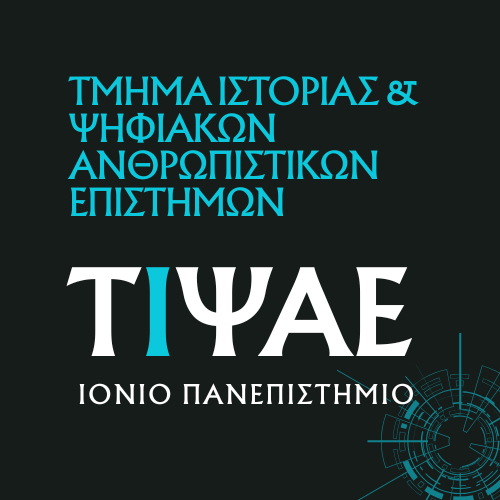HISTORY OF THE GREEK REVOLUTION
Teaching Staff: Tzakis Dionysios
Course Code: ΙΝΕ201
Course Type: Compulsory Elective
Course Level: Undergraduate
Course Language: Greek
Delivery method: Lectures
Semester: 3rd
ECTS: 5
E Class Page: https://opencourses.ionio.gr/courses/DHI223/
Curricula: Curriculum in History up to 2024-25
The course focuses in the correlation between Greek War of Independence, the historical appearance of national movements and the outbreak of modern revolutions in Europe and America, during the “age of Revolutions”. Within this context, the lectures discuss the ideology of the secret revolutionary society ‘Philiki Etairia’, its organization and hierarchies, the social origin of its members, the growth and geographical expansion of its networks, the preparation and the outbreak of the War. We also focus in the main military and political events of the period in association with the deconstruction of traditional hierarchies, the restructure of social relations and the formation of modern states institutions. From this perspective, the Revolution of 1821 functions as a catalyst to the passage of Greek society from Tradition to Modernity.
At the end of the semester students will be able to identify, describe and analyze:
- The Greek War of Independence in the context of national revolutionary movements in Post-Napoleonic era.
- The organizational, ideological and social features of Philiki Etairia.
- The main political, ideological and social processes during the revolutionary years in regard to military enterprises and diplomacy.
Week #1: Introduction.
Week #2: The Greek National Movement.
Week #3: Philiki Etairia I: ideological and social features.
Week #4: Philiki Etairia II: structure, networks and preparations.
Week #5: The War: military structures and social mobility.
Week #6: Local and regional administrative authorities.
Week #7: National Assemblies and constitution-making.
Week #8: Central government and modern state institutions.
Week #9: Political rivalries and civil wars.
Week #10: The Governance of I. Kapodistrias.
Week #11: Greek Revolution as a ‘European’ Event I: Philhellenism.
Week #12: Greek Revolution as a ‘European’ Event II: Diplomacy.
Week #13: Conclusions.
- R. Beaton, Ο πόλεμος του Μπάιρον. Ρομαντική εξέγερση, ελληνική επανάσταση, Αθήνα, Πατάκη, 2015.
- Δ. Δημητρόπουλος, Χρ. Λούκος, Π. Μιχαηλάρης (επιμ.), Όψεις της Επανάστασης του 1821. Πρακτικά Συνεδρίου, Αθήνα: ΕΜΝΕ-Μνήμων, 2018.
- Ν. Διαμαντούρος, Οι απαρχές της συγκρότησης σύγχρονου κράτους στην Ελλάδα, 1821-1828, Αθήνα, ΜΙΕΤ, 2002.
- Ν. Θεοτοκάς, «Η επανάσταση του έθνους και το ορθόδοξο γένος. Σχόλια για τις ιδεολογίες του Εικοσιένα», Ν. Θεοτοκάς, Ν. Κοταρίδης, Η οικονομία της βίας. Παραδοσιακές και νεωτερικές εξουσίες στην Ελλάδα του 19ου αιώνα, Αθήνα, Βιβλιόραμα, 2006, σ. 11-57.
- Ιστορία του Νέου Ελληνισμού, 1770-2000, επιμ. Β. Παναγιωτόπουλος, τ. 3, Αθήνα, Ελληνικά Γράμματα/ εφ. Τα Νέα, 2003.
- Ό. Κατσιαρδή-Hering (επιμ.): Οι πόλεις των Φιλικών: οι αστικές διαδρομές ενός επαναστατικού φαινομένου. Πρακτικά Ημερίδας, Αθήνα, Ίδρυμα της Βουλής των Ελλήνων, 2018.
- Ν. Κοταρίδης, Παραδοσιακή Επανάσταση και Εικοσιένα, Αθήνα, Πλέθρον, 1993.
- Στ. Παπαγεωργίου, από το γένος στο έθνος. Η θεμελίωση του ελληνικού κράτους, 1821-1862), Αθήνα, Παπαζήσης, 2004.
- Π. Πιζάνιας (επιμ.), Η Ελληνική Επανάσταση του 1821. Ένα ευρωπαϊκό γεγονός, Αθήνα: Κέδρος 2009.
- Ν. Ροτζώκος, Επανάσταση και Εμφύλιος στο Εικοσιένα, Αθήνα: Ηρόδοτος 22015.
The lectures are conducted in classroom (direct instructions) with the help of PowerPoint and are supported by printed and electronic material.
The benefits of the asynchronous e-learning platform of the Ionian University (Open eClass).
Written examination.
Back



